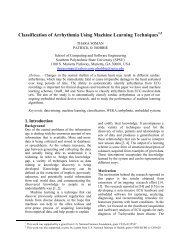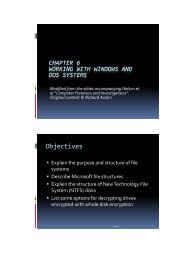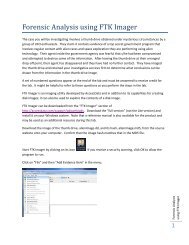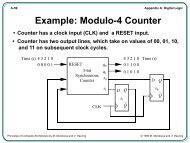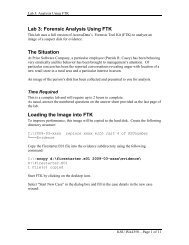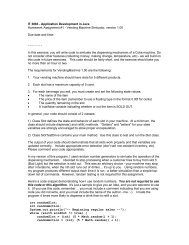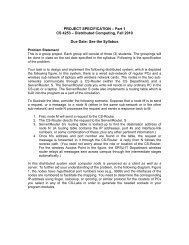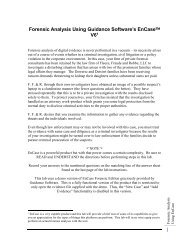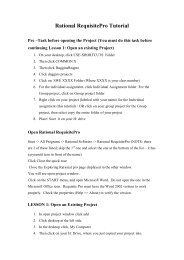You also want an ePaper? Increase the reach of your titles
YUMPU automatically turns print PDFs into web optimized ePapers that Google loves.
24.10 New Features in Version 1.4 Beta<br />
The Objective-C language was added.<br />
Message window contents can now be saved to file or printed.<br />
25 How To<br />
25.1 Change the language for a file:<br />
DRAFT, February 18, 2003, Page 118<br />
To change the language of a file, select "Edit" / "Compiler Settings" / "File" on the CSD window menu.<br />
Choose the "Language Specific" tab on the settings dialog. Select the desired language from the<br />
"Language" combo box. Once a language is selected, jGRASP will remember this setting. Also, the icons<br />
in file dialogs and in the browse window will reflect this setting.<br />
25.2 Drag files into jGRASP:<br />
Single or multiple files can be dragged onto the virtual desktop, or onto the control panel menu bar, to the<br />
right of the menus. The files will be opened in text mode.<br />
25.3 Open a file in binary mode:<br />
Using the "File" / "Open File" menu on the control panel or the "File" / "Open" menu on the CSD<br />
window menu will bring up a dialog that has "Text" vs. "Binary" radio buttons. All other methods of<br />
opening a file will open it in text mode. Opening a binary file in text mode is likely to corrupt it, since all<br />
three types of line terminators will be converted to a single type when the file is saved.<br />
25.4 Search for the selected text:<br />
F9 and Shift-F9 or Find and Shift-Find will search forward and backward for the selected text in a CSD<br />
window. This works across CSD Windows - the selected text does not have to be in the window being<br />
searched.<br />
25.5 Make ".h" a default file extension for C or C++ files only:<br />
Default extensions can be set at the global or project level. Select "Edit" / "Compiler Settings" / "Global" or<br />
"Project" on a CSD window, or "Settings" / "Compiler Settings" / "Global" or "Project" from the control<br />
panel. Select "C" or "C++" from the "Language" combo box, whichever one you don't want to be the<br />
default. Select the "Extensions" tab, click the default box for extensions off, and add the desired<br />
extensions (without "h" or "H"). You can use Ctrl-C and Ctrl-V to copy the old extensions and paste them<br />
back after clicking the default box off.<br />
25.6 Change the CSD include path for C or C++ files:<br />
To do this, you must create and use a new compiler environment. It usually makes sense to use that<br />
environment at the project level.







